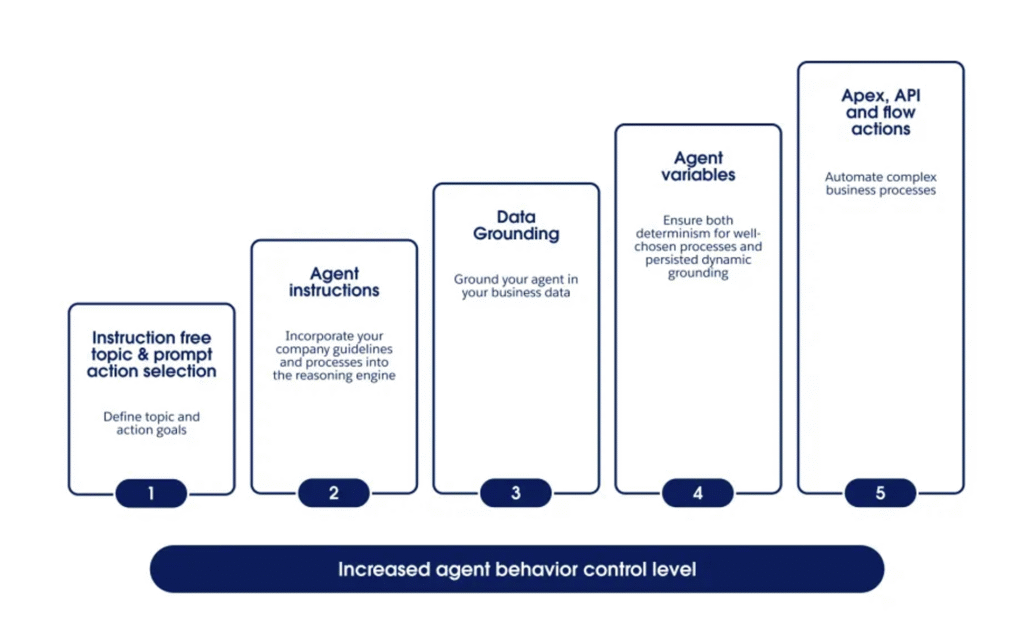The promise of AI agents is so powerful: digital labor working alongside your people or autonomously so your organization can execute with a speed and scale never before possible. But what if your AI agent quotes a customer the wrong price, processes a refund outside company policy or shares confidential data with the wrong person? It’s a big concern among CEOs. In a recent Chief Executive Group-Salesforce survey of 355 CEOs, 48 percent of those polled said monitoring AI accuracy and quality at scale was their top challenge—15 points higher than any other issue.
Trust has been the No. 1 value at Salesforce ever since it was founded in 1999, pioneering a new technology model of cloud computing and SaaS. Businesses bestow their trust in Salesforce by storing valuable company data in the cloud, knowing this data is safe and governed by the appropriate access controls.
In the age of AI agents, the definition of trust is even wider. As companies rely increasingly on autonomous agents to perform critical business functions, agents must become trusted business partners whose work is accurate, relevant and, most of all, reliable.
THE PREDICTABILITY CHALLENGE
In business IT, “reliable” typically means providing the same result for the same input. But agents don’t necessarily work like that. They are powered by large language models (LLMs) that can produce different outputs even with identical inputs. Unlike traditional chatbots, which follow pre-determined decision trees that structure the dialogs they can participate in, agents leverage LLMs’ advanced capabilities in natural language processing. LLMs enable agents to comprehend the intent behind a user’s input, even if it’s phrased in an unexpected way. Based on its understanding of intent, the agent can select the most appropriate action from among a range of possibilities. An agent can even formulate entirely new responses.

For CEOs, this creates a dilemma: The same flexibility that makes AI agents powerful also makes them unpredictable in business-critical situations. Agents need governance to comply with business requirements and adhere to operational guidelines. When executing business processes, they must demonstrate reliability and produce business outcomes that conform to predictable constraints.
Striking the right balance between the inherent flexibility of large language models with the need for enterprise-level control and predictability is the essence of using AI agents without fear in an organization. Based on our extensive work developing these systems at Salesforce, we suggest your teams deploy a structured approach with progressive implementation of control mechanisms, each adding a new layer of reliability. At a high level, these are:
1. Foundational Topic and Action Design. Think of this as defining an employee’s job description clearly. The process begins with the careful organization of an agent’s capabilities into distinct topics and specific actions. By creating clear and logical groupings, we reduce the risk of confusing the system into selecting the wrong action, which lays the groundwork for predictable behavior.
2. Explicit Instructions. Like company policy manuals that guide employee decisions, agent instructions provide the next level of control. These instructions act as guardrails and guidelines, directing the system on how to execute actions within its scope, adhere to company policies and manage the flow of conversation without overly scripting the interaction.
3. Data Grounding. To ensure agents work from verified facts, not assumptions, data grounding connects the agent to verified knowledge sources. Approaches like connecting agents to real-time company data enable them to pull in accurate information from knowledge articles and databases, which minimizes speculation and enhances trustworthiness.
4. Context and State Management with Variables. For more complex interactions, variables give agents memory of previous interactions. They allow the agent to retain context, keep important data persistent throughout a conversation and enforce a more predictable, reliable sequence of operations by conditioning action execution on previous steps.
5. Predictable Execution with Flows, Apex and APIs. For processes that must work the same way every time, with rigid, unvarying execution, the highest level of control is achieved through predetermined actions. Integrating agents with Salesforce Flows, Apex and APIs means predefined sequences can be executed with precision, removing dependency on user input or AI interpretation for critical steps.
By systematically applying these layers of control, from thoughtful design and clear instruction to data grounding, state management and predetermined process automation, your developers can successfully navigate the challenges of building reliable agents with consistent business outcomes. That means more transactions with fewer errors, more customer trust—and a lot less worry in the corner office. More on this topic: salesforce.com/agentforce/five-levels-of-determinism







